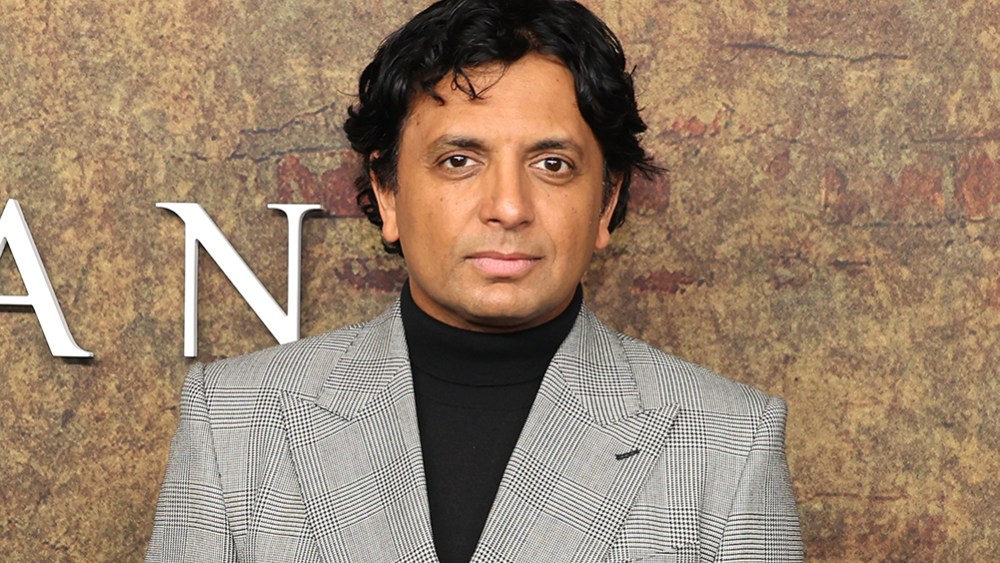M. Evening Shyamalan testified Wednesday that he and his collaborators on the Apple TV+ show “Servant” did not steal a pair of delusional moms and her dolls from a 2013 Justice movie.
The director told jurors that the copyright dispute with “Emanuel” director Francesca Gregorini was “obviously 100 percent a misunderstanding.”
“This allegation is completely contrary to every little thing I do and every little thing I try to express,” Shyamalan said.
When asked if he had plagiarized anything from the movie, he replied: “Not at all.”
Gregorini sued Apple, Shyamalan and others associated with “Servant” shortly after the show premiered in 2019. She claimed the show clearly borrowed key parts from her film, which depicts a nanny who colludes with her mother and mistakenly believes the doll is real. .
The federal trial began last week in Riverside, California. During her testimony Thursday, Gregorini said she was “shocked” when she first saw a trailer for the show.
“I can't imagine what I've seen before,” she said. “I probably mainly see them taking my movie and then…reshooting it.”
She claims the show occupies “the beating heart and skeleton of my films” while also reflecting specific character shots and scenes.
She said her brokers and peers discouraged her from filing a lawsuit, but she decided to take a stand because this type of copycat behavior was “common in my industry.”
“I find that when I cooperate well, I prepare myself, for what happens to me, but I also prepare myself for other people who, for one reason or another, may not be able to survive it in court. Have a nice day,” she mentioned. “You can't take someone else's work, repurpose it, make it your own, and never give credit or compensation to the creator.”
Shyamalan, a producer on “Servant” and director of the first episode, testified Wednesday that he had never seen Gregorini's film until earlier this month.
When he saw it, he said he found “every little thing in it was from a different movie.” His legal expert, Nicolas Jampol, introduced Shyamalan to a set of images from “The Truth About Emanuel.” , the images are similar to those from Shyamalan's 1999 breakthrough The Sixth Sense.
Shyamalan mentioned that he wasn't accusing Gregorini of stealing from him, just pointing out that every filmmaker has a standard language.
“I don't take them personally. Anyone can make these pictures,” he said. “We're all learning from each other, and from Hitchcock and Kubrick much earlier than we did. They usually didn't invent it. It preceded them and continues on after them.”
“Servant” was created by writer Tony Basgallop, who testified last week that he began working on the concept in 2005. He said he drew on his own personal life experiences and had never seen or heard of Gregorini's film before the lawsuit began.
Patrick Arenz, Gregorini's legal expert, noted that Basgallop didn't include the doll component until 2016. Arends said Basgallop was struggling with his career at the time and was determined to make money. Arends believed the doll was crucial to promoting and producing the script — and it was from “Emanuel.”
Shyamalan said in testimony Wednesday that he was “shocked” when he first learned Basgallop's script in 2017. He said he was also pleased to learn that the dolls could be used to comfort grieving mothers.
“I was ecstatic,” he said, adding that it was important to tell supernatural stories in real life. “Having that ladder — like in The Sixth Sense , when your hair stands up and it’s a ghost — that’s the one thing that gets you up the mythology.”
Arends tried to get Shyamalan to acknowledge a series of parallels between the film and the present. In separate instances, Shyamalan provided more context to differentiate the works, and Arendz said he “digressed” and instructed him to answer the question immediately.
Arends points out that the mother character in “Servant” doesn't “stand up” and reveal what happened to her child until the very end of the episode – just like the making of the movie.
“Thriller — What Happened in Jericho — I needed to avoid waste,” Shyamalan said. “This is an important engine.”
Under friendly questioning from his personal attorney, Shyamalan told the jury about his expertise in film school, his early career and the way he “discovered my language” through “The Sixth Sense.” He said he was facing the problem of adapting his signature filmmaking style – what he calls “closed”, “family-focused” supernatural thrillers – to television.
“I like to suggest… leave the sentence incomplete. You ask the best questions but don't answer them,” he said. “We're sushi makers. We're doing the minimum number of elements and the best quality.”
He said he found the infringement claims “complicated.” He said he hadn't seen “Emmanuel” before because he knew he hadn't borrowed it, thinking it was accused of jewelery robbery.
“I don't necessarily look for jewelry,” he said. “I didn't steal them.”
On Wednesday, the plaintiffs asked a compensation expert to testify about the revenue Apple makes from its “servants.” Apple's legal experts asked for the court to be closed, noting that the testimony would involve trade secrets and technology, such as current ratings information and compensation from the defendants. It was decided that Sunshine Sykes ordered members of the public to leave to give evidence.
The case is expected to go before a jury later this week.
Post M. Evening Shyamalan denies plagiarism in 'Servant' trial first appeared in all celebrities.

